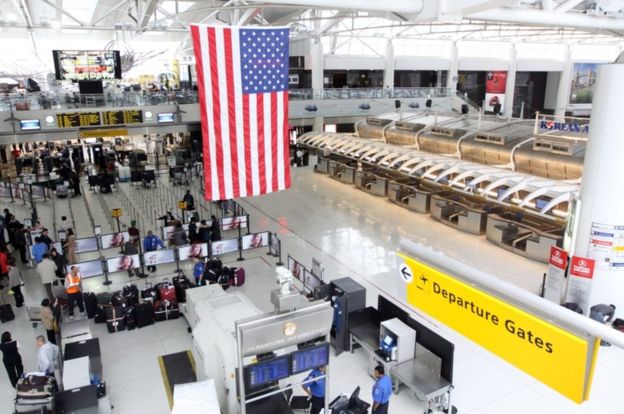![]()

If approved, the US state department proposal could affect around 14.7 million people a year. Photo credit : Reuters
The Trump administration has said it wants to start collecting the social media history of nearly everyone seeking a visa to enter the US.
The proposal, which comes from the state department, would require most visa applicants to give details of their Facebook and Twitter accounts.
They would have to disclose all social media identities used in the past five years.
About 14.7 million people a year would be affected by the proposals.
The information would be used to identify and vet those seeking both immigrant and non-immigrant visas.
Applicants would also be asked for five years of their telephone numbers, email addresses and travel history. They would be required to say if they had ever been deported from a country, or if any relatives had been involved in terrorist activity.

The proposals would place an additional burden on travellers whose countries do not have a visa exemption deal with the US. Photo credit : GETTY IMAGES
The proposal would not affect citizens from countries to which the US grants visa-free travel status – among them the UK, Canada, France and Germany. However, citizens from non-exempt countries like India, China and Mexico could be embroiled if they visit the US for work or a holiday.
Officials defended the proposal by saying it would help to identify potential extremists.
Social media came under scrutiny after the shootings in 2015 in San Bernadino, California, in which 14 people died. The authorities said they had missed signs of radicalisation in messages on a messaging platform sent between the attackers.
What’s the current stance on requesting social media?
Under rules brought in last May, officials were told to seek people’s social media handles only if they felt “that such information is required to confirm identity or conduct more rigorous national security vetting”, a state department official said at the time.
The tougher proposal comes after President Trump promised to implement “extreme vetting” for foreigners entering the US, which he said was to combat terrorism.
“Maintaining robust screening standards for visa applicants is a dynamic practice that must adapt to emerging threats,” the state department said in a statement, quoted by the New York Times.
“We already request limited contact information, travel history, family member information, and previous addresses from all visa applicants. Collecting this additional information from visa applicants will strengthen our process for vetting these applicants and confirming their identity.”
Who decides if it happens?
The idea is subject to approval by the Office of Management and Budget.
The public will have two months to comment on the proposal before it makes a decision.
How does this affect free speech?
Civil liberties groups have condemned the policy as an invasion of privacy that could damage free speech.
“People will now have to wonder if what they say online will be misconstrued or misunderstood by a government official,” said Hina Shamsi of the American Civil Liberties Union.
“We’re also concerned about how the Trump administration defines the vague and over-broad term ‘terrorist activities’ because it is inherently political and can be used to discriminate against immigrants who have done nothing wrong,” she said.
The social media platforms covered in the proposal include US-based entities such as Instagram, LinkedIn, Reddit and YouTube. However, the New York Times reports that overseas platforms such as China’s Sina Weibo and Russia’s VK social network would also be included.
———————————————————————————-
Reported by : BBC News / 31 March 2018
Link : http://www.bbc.com/news/world-us-canada-43601557






